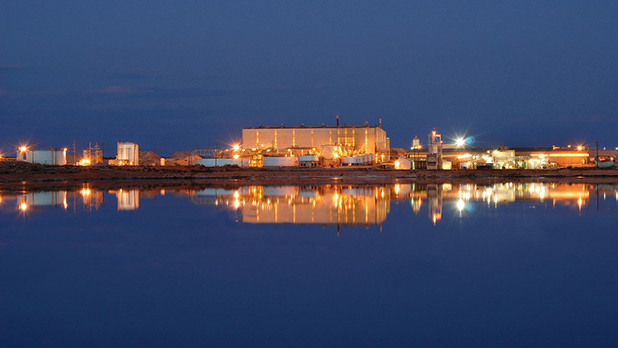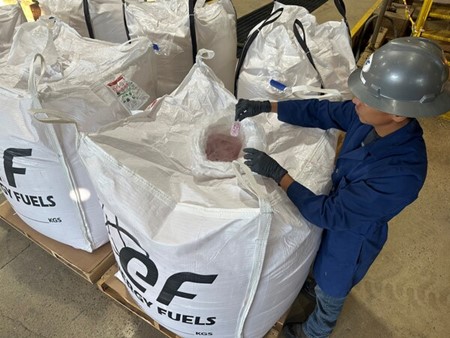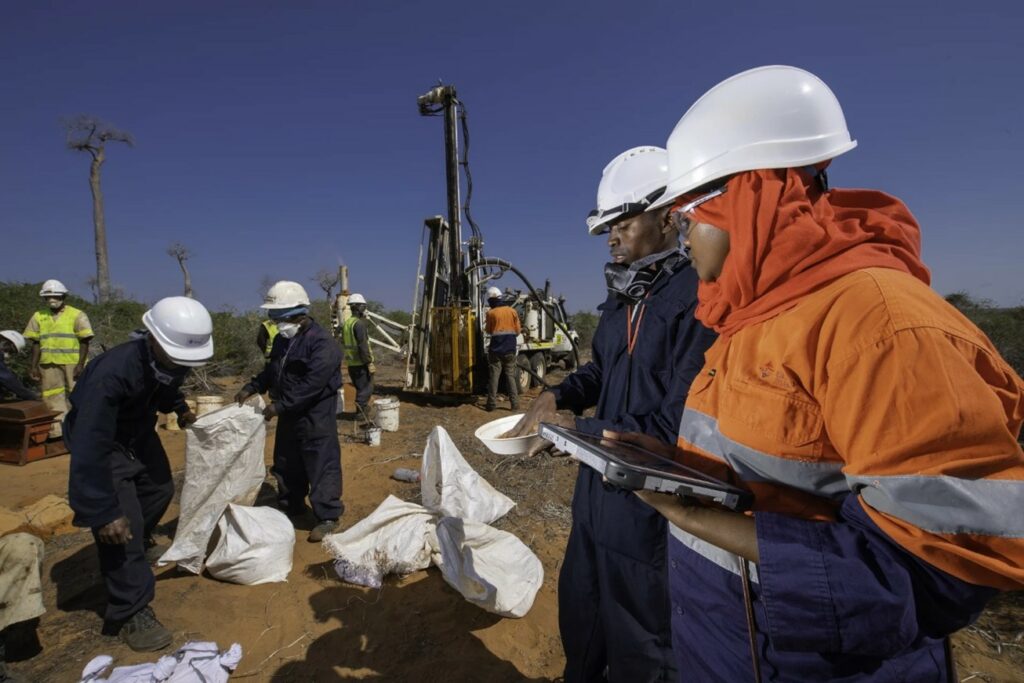
Uranium mining company Energy Fuels, riding a wave of high prices for its radioactive ore, has commissioned its mill in White Pass, Utah to add commercial production of neodymium praseodymium as a secondary product. With two new deals tapping properties in Australia and Madagascar, and a key executive appointment, the company is advancing further toward becoming a significant supplier of processed magnetic rare earths in North America.

“Energy Fuels continues to capitalize on uranium market opportunities, profitably selling an additional 100,000 pounds of uranium on the spot market, signing a new long-term sales contract with a U.S. nuclear utility at supportive pricing, and mining uranium from three of our conventional mines in anticipation of a large-scale uranium processing campaign at our White Mesa Mill expected to begin later this quarter and continue through 2025 and into 2026. Simultaneously, we achieved several milestones in the company’s long-term value creation strategy by entering into agreements to add two world-scale rare earth and heavy mineral sand projects to our portfolio which, upon earn-in of one and acquisition of the other, will together have the potential to generate significant margins and cash flows in the future,” said Mark Chalmers, President and CEO, as he reported in early August on the latest quarter’s activities. The company is based in Lakewood, Colorado in the Denver metro area.
“This quarter, we also achieved another U.S. critical mineral industry milestone when we produced ‘on-spec’ separated NdPr at commercial scale at our White Mesa Mill in Utah from monazite sourced from Florida and Georgia. Our efforts this quarter have moved us closer to our business objective of becoming a long-term U.S. critical minerals company that produces many of the raw materials needed for the energy transition.”
“It is an extremely exciting and busy time at Energy Fuels, as we plan for a future in which we profitably produce uranium, rare earth elements, titanium, zirconium, vanadium, and even potentially radioisotopes needed for life-saving cancer treatments. The ‘common thread’ connecting all these critical minerals is that they are typically produced from naturally radioactive feedstocks, which Energy Fuels has the licenses, infrastructure and capability to manage in a way unique to the company within the Western Hemisphere.”
The Phase 1 REE separation circuit at the company’s White Mesa Mill was completed in Q1-2024 and successfully commissioned in Q2-2024, producing ‘on-spec’ separated NdPr and reaching a major strategic goal to add an entirely new, high-value product line alongside the company’s uranium business.
Rare Earth Element production milestones and expansion plans

The mill has begun drying and packaging separated NdPr, which is expected to continue through the end of the quarter. The company expects to produce about 25-35 tons of separated NdPr and 10-20 tons of a “heavy” Sm+ mixed rare earth carbonate from the circuit by early Q3-2024, after which time the Company expects to begin processing stockpiled uranium ore and alternate feed materials for the large-scale production run of U3O8 at the mill for the remainder of the year, through 2025, and into 2026. During Q2-2024, the company produced approximately 12 tons of separated NdPr.
During the current REE campaign, production of the heavy REE concentrate is expected to include roughly 1,500 kilograms of dysprosium (“Dy”) and 400 kilograms of terbium (“Tb”). The company plans to utilize all or a portion of the heavy concentrate for pilot-scale test work to design, permit and construct commercial Dy, Tb and potentially other REE separation at the mill in coming years.
At present, the circuit has the capacity to process approximately 8,000 to 10,000 tons per year of monazite, which will likely be sufficient to accommodate the quantity of monazite the company is already expecting to receive from current supply plans. In April, the company released a pre-feasibility indicating globally competitive capital and operating costs for the mill’s planned Phase 2 expanded REE oxide production.
The plans envision one or more additional facilities, capable of processing 30,000 tons per year of Monazite to produce approximately 3,000 tons per year of NdPr oxide. The study shows globally competitive capital expenditures of $348 million for the 30,000 tons per year Phase 2 separation facility and an average processing cost of $29.88/kg NdPr. Work is proceeding currently to update the mill to increase throughput to 40,000 to 60,000 tons per year of monazite, producing roughly 4,000 to 6,000 tons of NdPr, 150 to 225 tons per year of Dy, and 50 to 75 tons per year of Tb.
In other developments, two agreements have been forged with Australian minerals companies to add two REE and heavy mineral sand projects to secure low-cost sources of monazite feed for the mill’s current and future REE separation infrastructure, while also potentially producing significant amounts of other minerals as by-products. The sites are located in Australia and Madagascar.
One agreement is with Astron Corporation Ltd to jointly develop the Donald HMS and REE project in Australia. The Donald Project is a well-known HMS and REE deposit that Energy Fuels believes could provide the mill at White Pass with a near-term, low-cost and large-scale source of monazite sand for the recovery of REE oxides. The project has most licenses and permits in place or at an advanced stage of completion. Under the joint venture agreements, Energy Fuels has the right to invest up to AUS$183 million ($122 million) to earn up to a 49% interest in the venture, of which approximately $10.6 million is expected to be invested in 2024 in preparation for a final investment decision. If a positive decision is made, the remainder would be invested to develop the project and to earn into the full 49% interest in the venture while Astron would receive shares in Energy Fuels having a value of up to $17.5 million. The project has the potential to produce 7,000 to 8,000 tons of monazite per year during its first phase, and 13,000 to 14,000 tons during its second phase.

The second agreement is for the acquisition of Base Resources Ltd, an African-focused mineral sands producer headquartered in Perth. The deal would include its Toliara HMS project in Madagascar which contains a long-life, high-value and low-cost monazite stream, produced as a by-product of primary titanium and zirconium production. Toliara’s monazite is expected to be processed at White Pass into separated REE products, along with uranium. The transaction is expected to be completed in early October 2024.
Former critical minerals leader from General Motors joins Energy Fuels

In June, Debra Bennethum joined the management team as Director, Critical Minerals & Strategic Supply Chain. She previously served as the EV Critical Minerals Manager in the Global Purchasing & Supply Chain Division of General Motors and, prior to that position, as the Program Purchasing Manager for GM’s Battery Electric Vehicles and Crossovers division. At GM, she executed supply strategies to ensure resilient EV critical mineral supply chains, which included the REEs for production of permanent magnets as well as battery critical minerals. She also identified innovative suppliers, vetted technical merit, evaluated cost competitiveness, and led negotiations for long-term supply arrangements. She further managed over $1.5 billion in investment projects from conception to execution, collaborating with engineering and internal stakeholders to ensure resilient supply chains for GM.
Having worked at GM for over 12 years, now, Energy Fuels believes she will fill a critical role in the company’s REE sales and marketing enterprises including cultivating relationships with original equipment manufacturers and other customers, negotiating supply, offtake and other agreements for its products, evaluating REE collaborations in metal-making, alloying and magnet-making, and assisting in evaluating, and potentially pursuing, government funding and other support. She will be based in Detroit, Michigan, hub of the U.S. automotive industry.
“We believe Ms. Bennethum is the ideal person to lead Energy Fuels’ rare earth marketing efforts and collaborations, including the sale of our products to metal-makers, magnet-makers, EV and automotive OEMs, renewable energy companies, rare earth recycling companies, U.S. defense suppliers and other customers,” said Chalmers. “Ms. Bennethum is well known throughout the rare earth industry, and we believe her decision to join Energy Fuels is a significant ‘vote of confidence’ in our rare earth plans going forward.”
For more info, see www.energyfuels.com, www.astronlimited.com.au, www.baseresources.com.au.



